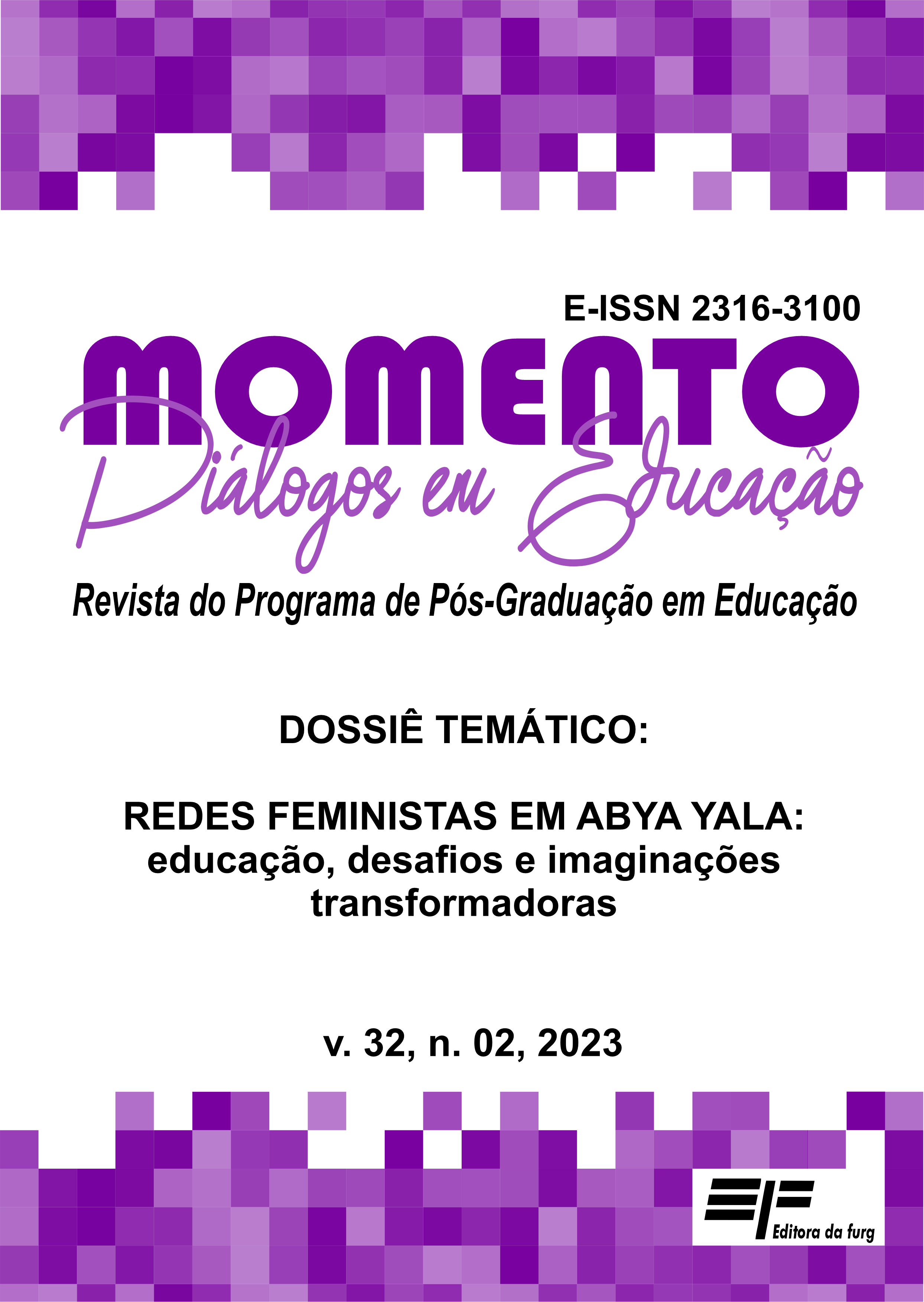INTERNETED ARTISTIC PRACTICES
strategies, networks, affects
DOI:
https://doi.org/10.14295/momento.v32i02.15667Keywords:
Autoethnography. Artistic practices. Networks. Feminist art.Abstract
Faced with the challenges that move us to action in our contexts, the question of our own artistic practices, strategies and networking challenges us in a special way: what is the critical potential of our artistic practices; With whom do we share them and how do we inhabit them? From this arises a nucleus of questions that become the trigger that leads us to reflect from our own experience, taking into account the ethnographic method and assuming the biography itself as a place of observation and knowledge: What was the process of self-recognizing ourselves as artists like? From what specific artistic practices do we establish relationships, ties and affections with the community we inhabit? How do we weave our own practices? How is it that this history built collectively and in the field of creativity defies an art system that reproduces overlapping oppressions? The theoretical coordinates that help us make our shared experience in the challenge of naming ourselves feminist artists, assembled in a transdisciplinary and transnational network, more understandable, include theorists such as Andrea Giunta (2018), Breny Mendoza (2023), Rita Segato (2018), María Galindo (2022) and Raquel Gutiérrez (2022), among others. The article closes with a series of final reflections on the individual experience as a source of knowledge, the forms of friendship as a critical path, the recovery of the body-territory as a slogan and affective bonding as a strategy.
Downloads
References
ÁLVAREZ VEINGUER, A.; ARRIBAS LOZANO, A.; DIETZ, G. (Eds.). Investigaciones en movimiento. Etnografías colaborativas, feministas y decoloniales. CLACSO, 2020
ANTE LEZAMA, Minerva.; ISE, María Laura. Autoetnografía a dos voces: el potencial crítico de nuestras prácticas artísticas- académicas-feministas. México. Revista del Posgrado en Sociología de la Benemérita Universidad Autónoma de Puebla “Bajo el volcán”. Número 5, Dossier temático: las luchas feministas y de las mujeres como potencia de transformación. Caminos recorridos y horizontes políticos. 2021. Disponible en: http://www.apps.buap.mx/ojs3/index.php/bevol/article/view/2256
BECKER, Howard. Los mundos del arte. Bernal: Universidad Nacional de Quilmes, 2008.
CANO, Vir. Borrador para un abecedario del desacato. 2021. Madreselva.
CABNAL, Lorena. Feminismo comunitario desde las mujeres Maya-Xinca de Guatemala. Chiapas: La cosecha, S/F.
CORDERO REIMAN, Karen y SAENZ, Inda. Crítica feminista en la teoría e Historia del Arte. Ciudad de México: Universidad Iberoamericana, 2007.
CURIEL, Ochy. La nación heterosexual. Análisis del discurso jurídico y el régimen heterosexual desde la antropología de la dominación. . Colombia: Brecha lésbica y En la frontera, 2013.
CIEG-UNAM. Boletín Números y Género Núm. 14. “¿Quiénes exponen en los museos de la UNAM?”. 2017. Disponible en: https://tendencias.cieg.unam.mx/boletin-14.html
ESPINOSA MIÑOSO, Yuderkis. De por qué es necesario un feminismo descolonial. Icaria Editorial, 2022.
GALINDO, María. Feminismo bastardo. Canal Press y Editorial Mantis. 2022.
GIUNTA, Andrea. Feminismo y arte latinoamericano. Historias de artistas que emanciparon el cuerpo. Buenos Aires: Siglo XXI Editores, 2019.
GUTIÉRREZ AGUILAR, Raquel. Cartas a mis hermanas más jóvenes “Primera carta: El pacto patriarcal”. Ciudad de México: Minervas Ediciones. 2020.
INEGI. Censo Nacional de Sistema Penitenciario Federal y Estatales 2022. 2023. Disponible en:https://www.inegi.org.mx/contenidos/programas/cnspef/2022/doc/cnsipef_2022_resultados.pdf
LUGONES, María. Subjetividad esclava, colonialidad de género, marginalidad y opresiones múltiples. Chiapas: Fusilemos la noche. 2019.
MENDOZA, Breny. Colonialidad, género y democracia. Akal, 2023.
OCHOA MUÑOZ, Karina. (Coord.). Miradas en torno al problema colonial. Pensamiento anticolonial y feminismos descoloniales en los sures globales. Akal. 2019.
REILLY, Maura. Curatorial activism. Towards an ethics of curating. Thames & Hudson, 2018
SEGATO, Rita Laura. Manifiesto en cuatro temas. Critical Times (2018) 1 (1): 212–225. Disponible en: https://doi.org/10.1215/26410478-1.1.212
SCHOR, Mira. (1997). Linaje paterno (pp.111-130) en Cordero Reiman, K. y Saenz, I. (2007). Crítica feminista en la teoría e Historia del Arte. México: Universidad Iberoamericana.
VIVEROS, VIGOYA, Mara. (Ed). Angela Davis, Gina Dent. Black Feminism. Teoría crítica, violencias y racismo. Bogotá: Universidad Nacional de Colombia. 2022.
NOCHLIN, Linda. (1971). ¿Por qué no han existido grandes mujeres artistas? (pp.17-43) en Cordero Reiman, Karen. y Saenz, Inda. Crítica feminista en la teoría e Historia del Arte. Ciudad de México: Universidad Iberoamericana. 2007.
Downloads
Published
How to Cite
Issue
Section
License
Copyright (c) 2023 Momento - Diálogos em Educação

This work is licensed under a Creative Commons Attribution 4.0 International License.
À Revista Momento − Diálogos em Educação, ficam reservados os direitos autorais, de todos os artigos nela publicados.


